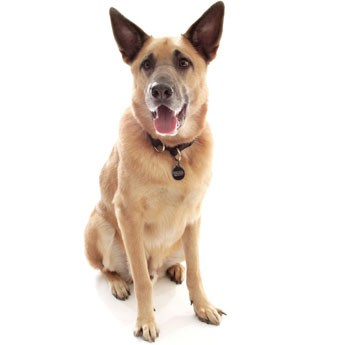Type the name of the breed you're looking for below
[wpdreams_ajaxsearchlite] Don't see the breed your're looking for? Click here and let us know!
Breed Characteristics
1 paw - breed exhibits the least amount of this characteristic
5 paws - breed exhibits most amount of this characteristic
Chinook
| Country of Origin | United States |
| Weight | Males: Average 70 lbs. (32 kg) Females: Average 55 lbs. (25 kg) |
| Height (at withers) | Males: 23 - 27 in. (58 - 69 cm) Females: 21 - 25 in. (53 - 64 cm) |
| Coat | Chinooks have a double coat of medium length hair. The undercoat is thick, soft, and downy in texture. The outer coat is coarse and the hair lies close to the body. Less dense coats are normal in very warm climates. The neck is well-furnished with hair, which forms a protective ruff blending into the apron. |
| Colour | The ideal colouration runs from light honey color to reddish-gold. Black markings on the inside corners of the eyes are preferred. Dark tawny to black markings on the ears and muzzle are preferred. |
| Litter Size | 4 - 8 puppies, average 6 |
| Life Span | 10 - 15 years. |
| Origin & History | The Chinook is a Northern breed derived from a single ancestor. The father of the breed, Chinook, was born on author/explorer Arthur Walden's Wonalancet, New Hampshire farm in 1917. He was one of three pups born to a "Northern Husky" female, sired by one of the dogs on Peary’s North Pole team. Chinook’s sire was a large, mixed-breed dog. Chinook was a "sport," a phenomenon of nature, not resembling either of his parents. He was an outstanding sled dog and accompanied Admiral Byrd's South Pole expedition in 1927. Chinook’s offspring, who inherited his coloring, size and general characteristics, were bred to combine the strength of the large freight dog with the speed of the smaller racing sled dogs. In the early 1900s, the Chinook set records for distance covered, loads carried and running time. This breed has been bred through the years by a small number of dedicated fanciers. The Chinook is a very rare breed. The Guinness Book of World Records listed the Chinook as the world's rarest dog in 1966 when only 125 existed. The Chinook used to be an outstanding sled dog, but in the 1980s the breed was almost extinct, with only 12 breedable dogs left in the world. Their sled drive is greatly reduced. They are much more companion dogs who are capable of doing any sort of work, but they really love sledding, skijoring and carting. They are particularly good at carting because, unlike their Siberian and Alaskan counterparts, they are easily trained in obedience and can work very calmly in harness. Fanciers are working to gain more recognition and are actively seeking sledders to work with the breeders in programs that emphasize the working qualities. The Chinook was recognized by the United Kennel Club in March 1991. The United Kennel Club worked with the COA (Chinook Owners Association) to develop a crossbreeding program, which uses dogs originally bred into the breed to create more diversity and health in the gene pool. There is an application process, stringent guidelines, and a committee to oversee the whole program. At the end of the program, the dogs will be eligible for purebred registration in the UKC. In an unprecedented move, the UKC also allows intact Chinook Crosses to be LP registered. (Only spayed/neutered non-pure dogs can be LP registered in the UKC.) The Chinooks New England Club is one of the affiliate clubs of the COA. They are also working hard at preserving the breed. |
| Personality | These are dedicated, hard-working and versatile sled dogs. Performing their given task is their primary concern in life. In addition to sled-pulling, the breed also can be used for carting, obedience, flyball, search and rescue, and packing. The build of the dog, coupled with its agile movement and drive, make it a great agility dog. One of the key breed characteristics is the Chinook's temperament: calm, non-aggressive, with a willing, friendly disposition. Chinooks are bred to work in teams and should not exhibit dog-aggression. Notwithstanding its gentle, even temperament, the Chinook is a dignified dog. Socialize well to prevent them from being reserved with strangers or unfamiliar surroundings. In action, the Chinook is graceful but purposeful, alert but calm. His expression reflects his intelligence; his proud carriage reflects his dignity. Most Chinooks make excellent pets for children, especially when the dog is raised with them (even with rough and tumble children). Most Chinooks tolerate children even when they haven't had any contact with them. These dogs are incredibly loyal. They work totally reliably off-leash and really only want to be with you. Given acres and acres of land, the dogs are generally going to be wherever you are; so having a lot of space is not a requirement, but you do need to take them for daily walks where they are made to heel beside or behind you, never in front, as the pack leader goes first. The Chinook needs to be close to its family and part of the family. They do not make good outdoor pets. The Chinook is generally good with non-canine pets. They need an owner who is confident and firm with them, but not harsh. If you are passive with them they will become strong willed. They need to be shown who is the "top dog". Chinooks are easily trained through positive reinforcement, but do not respond to heavy-handed training tactics. A calm authority in a way dogs can understand is best. They are very smart, and only need to know what you want them to do. |
Care Requirements
| Health | The following health conditions have occurred within the overall Chinook breed: excessive shyness, eye abnormalities, hip dysplasia, hormonal skin problems, mono/bilateral cryptorchidism, seizures and spondylosis. Generally, the breed is very healthy and these diseases occur in a small percentage of the population. Breeders are working hard to screen out dogs with any diseases listed above, and buyers should make sure the parents of a puppy are certified as free of eye and hip disease. |
| Grooming | The coat of the Chinook practically takes care of itself and requires little to no grooming. Some Chinook owners have reported their dogs shed twice a year for about a week; otherwise, they shed very little. Others have reported their dogs to shed heavily all year round. |
| Exercise | Chinooks require moderate exercise and are not hyper dogs, but should be taken for a daily walk. Once exercise is over, the dog will easily entertain itself or will rest. |
| Other Considerations | Chinooks make fine apartment dogs so long as the owner makes a commitment to regular exercise and walking. They do not bark often and can be left reliably after puppyhood for periods of time. Unlike their northern breed counterparts, these dogs do not make good outside pets. They are emotionally too sensitive, and isolation from human contact triggers separation anxiety and other emotional turmoil. These dogs should not be kept in a backyard and should always be considered a part of the family. State dog of New Hampshire |



